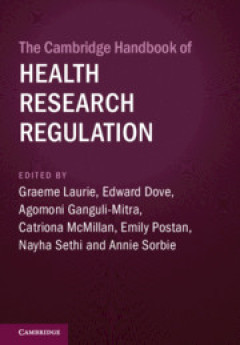Filter by

Bioethics And The Holocaust
This open access book offers a framework for understanding how the Holocaust has shaped and continues to shape medical ethics, health policy, and questions related to human rights around the world. The field of bioethics continues to face questions of social and medical controversy that have their roots in the lessons of the Holocaust, such as debates over beginning-of-life and medical genetics…
- Edition
- -
- ISBN/ISSN
- 9783031019876
- Collation
- -
- Series Title
- -
- Call Number
- Public health & preventive medicine

The Cambridge Handbook of Health Research Regulation
The first ever interdisciplinary handbook in the field, this vital resource offers wide-ranging analysis of health research regulation. The chapters confront gaps between documented law and research in practice, and draw on legal, ethical and social theories about what counts as robust research regulation to make recommendations for future directions. The Handbook provides an account and analys…
- Edition
- -
- ISBN/ISSN
- 9781108620024
- Collation
- xix, 444 p ; ill
- Series Title
- -
- Call Number
- 344.04196 CAM G

Chance encounters
In this rigorous and necessary book, Kristien Hens brings together bioethics and the philosophy of biology to argue that it is ethically necessary for scientific research to include a place for the philosopher. As well as ethical, their role is conceptual: they can improve the quality and coherence of scientific research by ensuring that particular concepts are used consistently and thoughtfull…
- Edition
- -
- ISBN/ISSN
- 9781800648517
- Collation
- x; 256 pg; ill.
- Series Title
- -
- Call Number
- 823.92 CHA c

Healthcare ethics for healthcare practitioners
Healthcare ethics cannot be limited in scope to apply only to the patient but needs to apply to the healthcare practitioner as well. The relationship between the patient and the healthcare practitioner has shifted from a power relationship to a complementary relationship. Leadership, mentorship and coaching play important roles in facilitating this shift. Several themes informed this book on he…
- Edition
- -
- ISBN/ISSN
- 9781920382995
- Collation
- 150p.
- Series Title
- -
- Call Number
- 362.1068 HEA h
 Computer Science, Information & General Works
Computer Science, Information & General Works  Philosophy & Psychology
Philosophy & Psychology  Religion
Religion  Social Sciences
Social Sciences  Language
Language  Pure Science
Pure Science  Applied Sciences
Applied Sciences  Art & Recreation
Art & Recreation  Literature
Literature  History & Geography
History & Geography